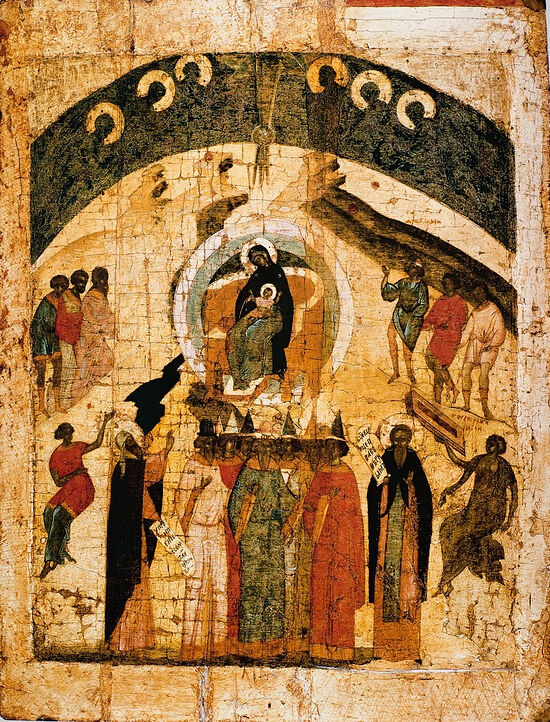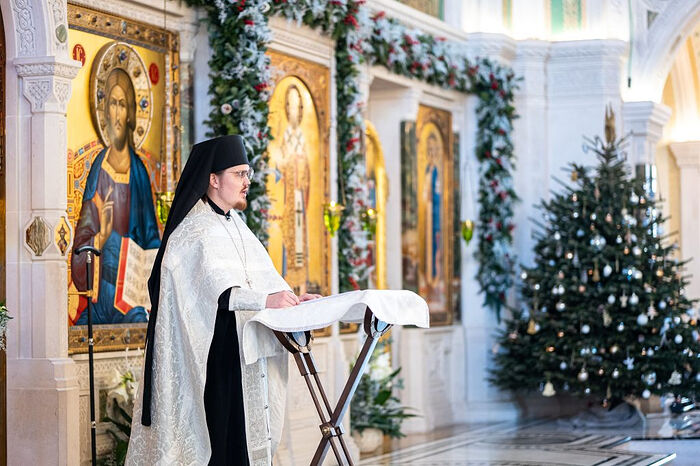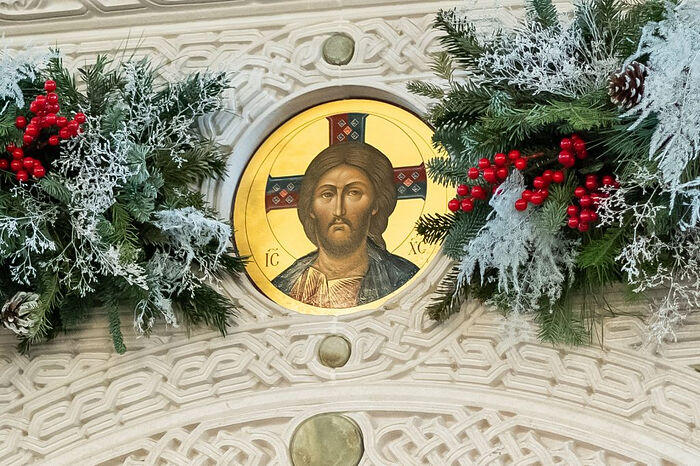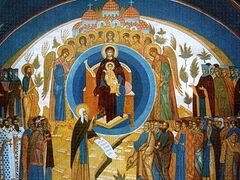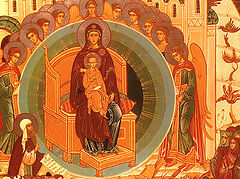In the name of the Father, and of the Son, and of the Holy Spirit!
Dear fathers, brothers and sisters! Today’s feast is called the Synaxis of the Most Holy Theotokos. It is called “Synaxis” not because it is dedicated to several saints (like the Synaxis of the Twelve Apostles of Christ), but because ancient Christians had a custom of gathering in holy churches on the day after the Nativity of Christ to glorify the Mother of God. For example, on January 20, the day after the feast of the Theophany, the Synaxis of St. John the Baptist is celebrated, and on April 8, the day after the Annunciation of the Most Holy Theotokos, the Synaxis of the holy Archangel Gabriel is celebrated. So today Orthodox people are gathering in churches to pray together, worship at the service and give thanks to the One through Whom our Savior was born into the world.
Not only does the entire Old Testament have passages prefiguring the Coming of Christ, but it also carries the idea of being chosen, which is seen in the consistent preparation of people to accept Christ the Savior. Thus, responding to God’s calls, in a generation of righteous people of the Old Testament, one was born who was able to become the Mother of God by human nature, who was able to conceive and give birth to the God-Man Jesus Christ. The Mother of God “represents the peak of holiness ever attained before Christ, under the conditions of the Old Testament, by anyone descended from Adam,” writes the Russian theologian Vladimir Lossky.
The Most Holy Theotokos did not sin in Her lifetime by Her free will, although She could always have potentially done so, like every human being. Today, in the Epistles we heard the words: Put on therefore, as the elect of God, holy and beloved, bowels of mercies, kindness, humbleness of mind, meekness, longsuffering; Forbearing one another, and forgiving one another, if any man have a quarrel against any: even as Christ forgave you, so also do ye. And above all these things put on charity, which is the bond of perfectness. And let the peace of God rule in your hearts, to the which also ye are called in one body; and be ye thankful (Col. 3:12-15).
With these words the Apostle Paul urges Christians to be lenient to each other, to forgive, to love, to have the peace of God in their hearts and to be friendly. The Most Holy Theotokos had all these virtues. She is the model of a proper Christian life. She has a special boldness of intercession with Her Divine Son for us. We address Her, saying, “Most Holy Mother of God, save us!”, as distinct from the saints, whom we ask: “Pray to God for us.” She is the “Steadfast Protectress of Christians” and “Constant Advocate before the Creator.” We call out to the Mother of God in our prayers: “O Fervent Intercessor! <...> Intercede for us all, O Lady, Queen and Sovereign, for Thou art the Divine Protection of Thy servants.”
Today we heard in the Gospel that when Christ approached Jericho, a blind man was sitting by the road and begging. When he heard that a multitude of people were walking past, he wondered what was going on there. He was told that it was Jesus of Nazareth. Then the blind man started shouting: Jesus, Thou Son of David, have mercy on me. They tried to silence him, but he shouted even louder and louder: Son of David, have mercy on me! When they brought him to Christ, He asked him: What wilt thou that I shall do unto thee? And he said, Lord, that I may receive my sight (cf. Lk. 18:35-41). It would seem, what else could a blind man want?
“To see” in the Gospel sense of the word means first of all to see yourself correctly, to see yourself as the foremost sinner. As we say in the prayer before Communion: “…Who camest into the world to save sinners, of whom I am first.” When a person sees himself as a sinner, his whole life opens up in an absolutely different light. Then he can no longer say, “It’s someone else’s fault! Circumstances turned out that way—they made me what I am, but I had nothing to do with it.”
The Gospel vision does not allow us to justify our dislike of someone else, to find proof that this or that person is bad and cannot be loved, should not be close to us and share in our lives.
The Gospel vision does not give us the right to think all the time that the Lord must help us always in everything, or if something unexpected happens to us, to say, “I don’t see God near me. He wasn’t with me when I had a hard time.” If you have the Gospel vision, you see God always and everywhere, even in situations where it seems that God cannot be there. So, Christ’s question, What wilt thou that I shall do unto thee? was not at all unnecessary or accidental.
The blind man who regained his sight immediately followed Christ, praising God (cf. Lk. 18:43). He followed Christ not because Christ held his hand all the time, but because he had gotten to know the way to Christ. He began to see with the sight that the Lord had given him.
Today, on the second day of the feast of the Nativity of Christ, let’s especially meditate on God’s love for people. God created man out of His love. People sinned and moved away from God, but the Lord did not forsake them. For several millennia He helped people, guided and supported them, and then, out of His love, He became incarnate, lived on earth, preached, suffered, died on the Cross and rose again in order to save people so that each one of us could believe in God properly, have the grace of the Holy Spirit, and inherit eternal life with God.
In these holy days let’s think about how we can respond to God’s love, for which He was born of the Virgin Mary; how we can show with our lives kindness towards our neighbors; to be lenient to others, to forgive, to love, to have the peace of God in our hearts and to be friendly—this is what the Apostle Paul calls on us to do today.
Let’s try to remember and thank our Heavenly Intercessor more often—the Most Holy Theotokos, Who is always the “Fervent Intercessor” of all people. Happy feast! Amen.

